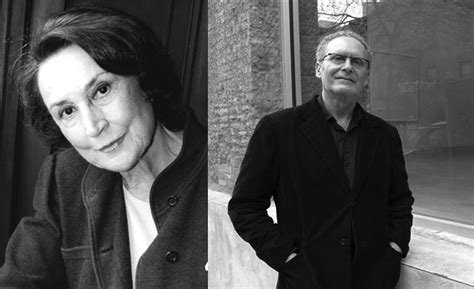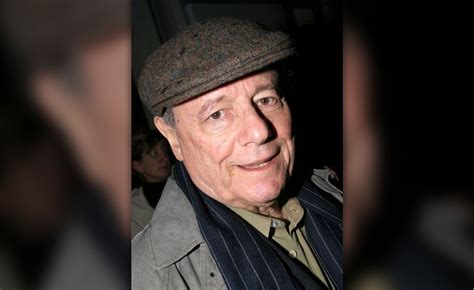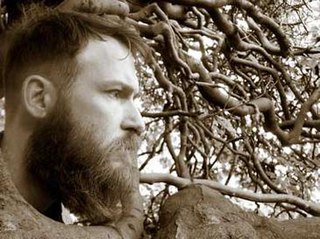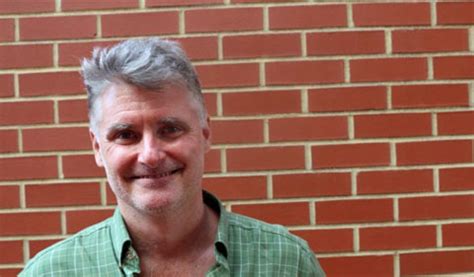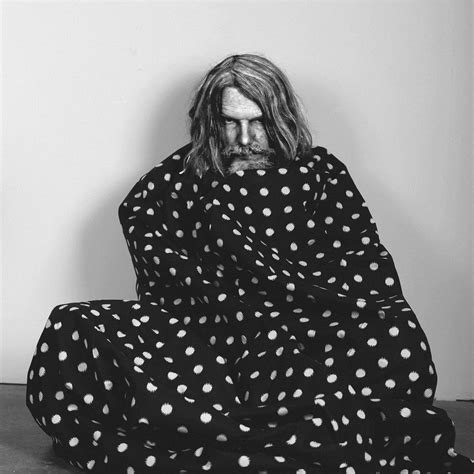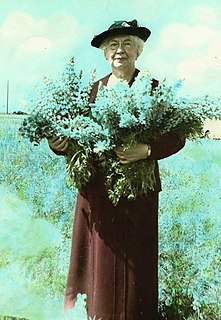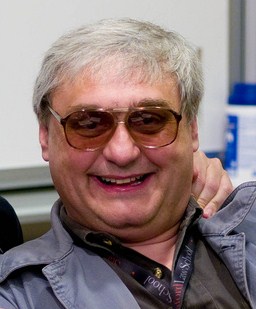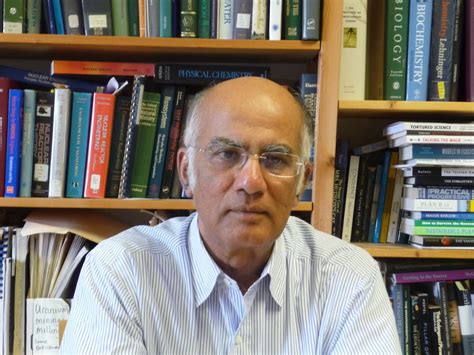Top 1126 Informed Quotes & Sayings - Page 19
Explore popular Informed quotes.
Last updated on December 21, 2024.
Paul Davies takes us on a logically and rhetorically compelling modern search for human agency. This outstanding analysis, well informed by naturalistic views of our evolved affective nature, is the kind of philosophical work that is essential for a field to move forward when ever-increasing findings from modern science are inconsistent with traditional philosophical arguments. This book is for all who wish to immerse themselves in the modern search for free will. It is steeped in the rich liqueur of current scientific and philosophical perspectives and delusions.
What's happening in the larger world always influences art. When I first started the gallery in 1959, one of the first things I learned was that most people assume artists know one thing and one thing only - that they were idiot savants. I found very quickly that most artists were very informed and very aware of what was happening in the world around them. So all of those things go together, especially for earthworks. And at that time there was such an intense interest in American art. So there was a great deal of attention paid to where it was going.
Although most informed balletomanes would place artistry above technique, artistry without a strong technique is a flaccid, bloodless thing indeed, whereas technique without much artistry can still dazzle us in the manner of the circus or sports arena translated to a higher plane. Though the perfect blend of the two elements is the consummation devoutly to be wished, the real enemy of good ballet is not the slight preponderance of one or the other but the prevalence of pantomime--the turning of dance into second-rate theater.
I think all of us set out to try and reach as many people. That's the whole point of being in a band: trying to get your music out there. So, any opportunity to do that, within reason. We're informed about where our music is going to be used; we get to say yes or no. There are things we can turn down, and there are things we can agree to. When it comes to movies and stuff like that, it's great for us. I don't think it's selling out. Maybe 10 or 20 years ago it was seen as selling out, but nowadays I think it's the only way to get your music out there.
When I first prepared this particular talk... I realized that my usual approach is usually critical. That is, a lot of the things that I do, that most people do, are because they hate something somebody else has done, or they hate that something hasn't been done. And I realized that informed criticism has completely been done in by the web. Because the web has produced so much uninformed criticism. It's kind of a Gresham's Law-bad money drives the good money out of circulation. Bad criticism drives good criticism out of circulation. You just can't criticize anything.
The Hoh Valley is an incredibly secure area. Any event occurs around us, we will instantly become informed of that event. This can even happen at a distance. When the body recognizes that you have a very large listening area, and you're getting all the information, the body relaxes. You can breathe more gently, the cortisol levels that are created by stress in our bloodstream dissipate, and we actually become healthier. And as a result, if we are actually fortunate enough to live in a place like that, we will live longer.
Once I saw a duck walking down the street so I went into Subway and ordered two pieces of bread, and they informed me that they could not do that, like there was some speical rule at Subway that two pieces of bread weren't allowed to touch. So the woman asked me what I wanted on the sandwich and I said I do not care, it is for a duck, and she was like oh then it's free. I was not aware that ducks eat for free at Subway. It's like give me a chicken fajita sub, but don't worry about ringing it up, it is for a duck.
I don't remember reading much at all during the writing of Eileen. I go through several years-long dry spells and I don't feel like reading at all. I was working part-time for a guy in Venice, California while I drafted Eileen. He wanted help in writing his memoir. The research had a lot to do with the 60s, so that must have informed my sense of the place and time in my novel, and perhaps even the memoir point-of-view. He was also from New England. It was a fun job. I learned a lot about motorcycle clubs, Charles Manson, hopping freight trains.
It's not enough, is it? Just to follow; just to have faith in someone bigger and smarter and better informed. That's how we're built, that's how every Partial is wired - to follow orders and trust in our leaders - but it's not enough. It never has been. We've followed our leaders, and sometimes they win and sometimes they lose; we do what they say and we play our part. But this is our decision. Our mission. And when we're done, it will be our victory, or our defeat. I don't want to fail, but if I do, I want to be able to look back and say, 'I did that. I failed. That was all me.
I am not fully informed of the practices at Harvard, but there is one from which we shall certainly vary, although it has been copied, I believe, by nearly every college and academy in the United States. That is, the holding the students all to one prescribed course of reading, and disallowing exclusive application to those branches only which are to qualify them for the particular vocations to which they are destined. We shall, on the contrary, allow them uncontrolled choice in the lectures they shall choose to attend, and require elementary qualification only, and sufficient age.
Dad told Uncle Seth not to screw things up,” she informed me as we washed our hands. “He said even if Uncle Seth is famous, him getting a woman like you defies belief.” I laughed and smoothed down the skirt of my dress. “I don’t know about that. I don’t think your dad gives your uncle enough credit." Brandy gave me a sage look, worthy of someone much older. “Uncle Seth spent last Valentine’s Day at a library.
How did I get into the world? Why was I not asked about it and why was I not informed of the rules and regulations but just thrust into the ranks as if I had been bought by a peddling shanghaier of human beings? How did I get involved in this big enterprise called actuality? Why should I be involved? Isn't it a matter of choice? And if I am compelled to be involved, where is the manager—I have something to say about this. Is there no manager? To whom shall I make my complaint?
I think, at the L.A. County Museum of Art, I saw my first example of Kerry James Marshall, who had a very sort of heroic, oversized painting of black men in a barbershop. But it was painted on the same level and with the same urgency that you would see in a grand-scale [Anthony] van Dyck or [Diego] Velazquez. The composition was classically informed; the painting technique was masterful. And it was something that really inspired me because, you know, these were images of young, black men in painting on the museum walls of one of the more sanctified and sacred institutions in Los Angeles.
I would model well-being by presenting myself as a high-energy person who loves what I am doing and who is thrilled to be able to offer books, tapes, and products designed to make people feel good. I would explain that they are in a store filled with this kind of energy and that creating such a space is exactly why I got into the business in the first place. If you want to feel good, then my store is the place you should visit on a regular basis. I would stay very informed about what's out there and make sure I carry many things with very high energy.
For the Second Amendment to do its job, the other side must become much better informed. I watched an action-adventure program last night that asserted that the famous AK-47 - the original peoples' rifle (and Authority's greatest mistake) - is rare in this country, and that the only ones here were originally smuggled in from the Middle East, or possibly from South America. The idiots who wrote this mess seemed unaware that after legal imports - mostly from China - were illegally cut off by executive order, they began to be manufactured here.
If love is the soul of Christian existence, it must be at the heart of every other Christian virtue. Thus, for example, justice without love is legalism; faith without love is ideology; hope without love is self-centeredness; forgiveness without love is self-abasement; fortitude without love is recklessness; generosity without love is extravagance; care without love is mere duty; fidelity without love is servitude. Every virtue is an expression of love. No virtue is really a virtue unless it is permeated, or informed, by love.
A writer writes a book. People read it. You don't know what they're reading, really. You read a review and think, "That is so inaccurate. You can't have been reading my book with any kind of attention, because that is all wrong, that's even the wrong name you're including there." But these reviewers have been diminished in importance, the work is so little respected. If you're reviewed by a real critic, by James Wood or Louis Menand, then you get something that is informed, interesting, and highly articulate. But the average review doesn't have that kind of depth anymore.
Schools should be democratic public spheres. They should be places that educate people to be informed, to learn how to govern rather than be governed, to take justice seriously, to spur the radical imagination, to give them the tools that they need to be able to both relate to themselves and others in the wider world. I mean, at the heart of any education that matters, is a central question: How can you imagine a future much different than the present, and a future that basically grounds itself in questions of economic, political and social justice?
LSD was my "wonder child", we had a positive reaction from everywhere in the world. Around two thousand publications about it appeared in scientific journals and everything was fine. Then, at the beginning of the 1960s, here in the United States, LSD became a drug of abuse. In a short time, this wave of popular use swept the country and it became "drug number one". It was then used without caution and people were not prepared and informed about its deep effects. Instead of a "wonder child", LSD suddenly became my "problem child".
Higher education isn't just a personal investment. It's a public good that pays off in a more competitive workforce and better-informed and engaged citizens. Every year, we spend nearly $100 billion on corporate welfare, and more than $500 billion on defense spending. Surely ensuring the next generation can compete in the global economy is at least as important as subsidies for big business and military adventures around the globe. In fact, I think we can and must go further - not just making public higher education tuition-free, but reinventing education in America as we know it.
Between 1831 and 1891, US armed forces - usually the Marines - invaded Mexico, Cuba, the Dominican Republic, Puerto Rico, Panama, Colombia, Nicaragua, Uruguay, Brazil, Haiti, Argentina, and Chile a total of thirty-one times, a fact not many of us are informed about in school. The Marines intermittently occupied Nicaragua form 1909 to 1933, Mexico from 1914 to 1919, and Panama from 1903 to 1914. To 'restore order' the Marines occupied Haiti from 1915 to 1934, killing over two thousand Haitians who resisted 'pacification.'
The religious conflicts of the Reformation era were never simply and only about religion, because religion during this era as in the Middle Ages that preceded it, informed and was meant to inform every domain of life. Violence involving religion and touching other areas of life took many forms: from the Protestant destruction of Catholic religious art and objects in iconoclasm, to Catholic executions of Protestants who refused to renounce their views, to major destructive conflicts such as the French Wars of Religion and the Thirty Years' War.
COIL would very much like to see the creation of a newsgroup for minimal musics. We enjoy a wide spectrum of such musics, from La Monte Young, Alvin Lucier, Arvo Part, Nurse With Wound's Solilique For Lilith,The Dream Syndicate (orig.concept not the newer group who plundered the name) to Synus, Earth and so on.and on and on. Some new so called ambient musics fall between genres and so between newsgroups: some of our own music has certainly been deeply inspired by and informed by such musics,from Partch to Subotnic.
Inform yourself about animal issues, and listen to different perspectives on how to help animals. Don't latch onto the first opinion that you hear about what is the most urgent issue, or the best way to help animals. Read everything you can on the issues, and be critical when presented with facts. Take an honest look at what your talents, strengths, and passions are, and determine how they can be used to the greatest effect. Once you've informed yourself, do your own thinking. The best way for you to make a difference might not be obvious, and might be something that no one has thought of yet.
I once received a letter from an old lady in California who informed me that when the tired reader comes home at night, he wishes to read something that will lift up his heart. And it seems her heart had not been lifted up by anything of mine she had read. I think that if her heart had been in the right place, it would have been lifted up.
Most people are oblivious to F.A. Hayek's insight that the critical information needed to run an economy - or even 15 percent of one - doesn't exist in any one place where it is accessible to central planners. Instead, it is scattered piecemeal among millions of people. All those people put together are far wiser and better informed than Congress could ever be. Only markets - private property, free exchange and the price system - can put this knowledge at the disposal of entrepreneurs and consumers, ensuring the system will serve the people and not just the political class.
A democratic public forms when citizens gather together to deliberate and make public judgments about local and national issues that affect their lives. By associating together for public discussion, citizens learn the skills necessary for the health of a democratic public; listening persuading, arguing, compromising, and seeking common ground. When these skills are nurtured within the institutions of a democratic public, citizens educate themselves in order to make informed political decisions.
We are social beings who make communities with an urgency, and it is a stern charge to make us take refuge in the lonely world of oneself. ...Racism attempts to occlude our cosmopolitanism (of the songs in and out of our bones), and it often appropriates our mild forms of xenophobia into its own virulent project. Difference among peoples is something that we negotiate in our everyday interactions, asking questions and being better informed of our mutual realities. To transform difference into the body is an act of bad faith, a denial of our shared nakedness.
I don't think I have enough of an interest in today's cultural mood to connect with or reject it. I'm compelled by the ideas that arrive when I'm not trying, and I follow them through almost every time. I feel fortunate that these days, there are a lot of them. You could argue that they are informed by everything I'm experiencing culturally around me but I don't, for example, look online for new music or art very often, and I don't think there is much in contemporary culture for me. It's a needle in a haystack kind of thing, and I'd rather spend that time working on a new song.
Now consciousness, what is consciousness? Consciousness is being aware of one's surroundings, recognizing the existence, truth or fact of something; being aware of the very moment, the very instant that you are in; being aware of how you affect the human social, political, and natural ecology you are a part of and how it affects you. Consciousness is being informed and instructed through your groups peculiar culture on the effects of the varied ecologies on your immediate and distant ancestors, and to be aware of their interpretation of that experience.
In the deep jungles of Africa, a traveler was making a long trek. Coolies had been engaged from a tribe to carry the loads. The first day they marched rapidly and went far. The traveler had high hopes of a speedy journey. But the second morning these jungle tribesmen refused to move. For some strange reason they just sat and rested. On inquiry as to the reason for this strange behavior, the traveler was informed that they had gone too fast the first day, and that they were now waiting for their souls to catch up with their bodies.
Forever, reading has been central, the necessary fix, the support system. Her life has been informed by reading. She has read not just for distraction, sustenance, to pass the time, but she has read in a state of primal innocence, reading for enlightenment, for instruction, even. ... She is as much a product of what she has read as of the way in which she has lived; she is like millions of others built by books, for whom books are an essential foodstuff, who could starve without.
The relationships we have with our doctors are often the most trusted relationships of our lives. Our doctors tell us hard truths that others will not. We often tell our doctors what we will not tell others. We trust our doctors to give us the good, the bad and the ugly about our health so that each of us can make an informed decision.
Among the innumerable mortifications which waylay human arrogance on every side may well be reckoned our ignorance of the most common objects and effects, a defect of which we become more sensible by every attempt to supply it. Vulgar and inactive minds confound familiarity with knowledge and conceive themselves informed of the whole nature of things when they are shown their form or told their use; but the speculatist, who is not content with superficial views, harasses himself with fruitless curiosity, and still, as he inquires more, perceives only that he knows less.
The First Amendment is really at the very core of political speech, and political speech is at the core of the First Amendment. So, we want to be very careful to make sure that candidates for office are free to express their views so that people will make an informed choice. We don't want them holding back, and sort of concealing their views and then disclosing them afterwards.
You find very few critics who approach their job with a combination of information and enthusiasm and humility that makes for a good critic. But there is nothing wrong with critics as long as people don't pay any attention to them. I mean, nobody wants to put them out of a job and a good critic is not necessarily a dead critic. It's just that people take what a critic says as a fact rather than an opinion, and you have to know whether the opinion of the critic is informed or uninformed, intelligent of stupid -- but most people don't take the trouble.
Um, Bella? You've got a huge cut on your forehead, and it's gushing blood," he informed me. I clapped my hand over my head. Sure enough, it was wet and sticky. I could smell nothing but the damp moss on my face, and that held off the nausea. Oh, I'm so sorry, Jacob." I pushed hard against the gash, as if I could force the blood back inside my head. Why are you apologizing for bleeding?" he wondered as he wrapped a long arm around my waist and and pulled me to my feet.
I served as Chairman of the Intelligence Committee. Let me tell you, it's tough to find out what the CIA is doing. They led us astray on the weapons of mass destruction that they said Saddam Hussein found. We sent out Collin Powell, Secretary of State, former National Security Counselor, chief of staff, four star general, couldn't find it out. I'd be reluctant to cut into term limits. I think if the voters would become informed and aroused, they could impose the proper limits on the guys who ought to be out.
Big ideas come from the unconscious. This is true in art, in science, and in advertising. But your unconscious has to be well informed, or your idea will be irrelevant. Stuff your conscious mind with information, then unhook your rational thought process. You can help this process by going for a long walk, or taking a hot bath, or drinking half a pint of claret. Suddenly, if the telephone line from your unconscious is open, a big idea wells up within you.
We are great mysteries. No matter what we imagine we may know, even for all the facts we might gather, we don't know each other. Never do, probably never will. Our reputations depend on the opinions of the ill informed. We all have better moments than anybody ever knows, and so do all the others. We are, each one of us, books that are read by critics who only glanced at the chapter headings and the jacket flap. Each one of us is a secret, and on that basis we ought to treat each other with the deepest respect.
One day in 1965 Rajiv wrote me from London, where he was studying, and informed me, 'You're always asking me about girls, whether I have a special girl, and so forth. Well, I've met a special girl.' And when Rajiv returned to India, I asked him, 'Do you still think about her in the same way?' And he said yes. But she couldn't get married until she was twenty-one, and until she was sure she'd like to live in India. Sonia is almost completely an Indian by now, even though she doesn't always wear saris.
Nuclear weapons production and testing has involved extensive health and environmental damage .... One of the most remarkable features of this damage has been the readiness of governments to harm the very people that they claimed they were protecting by building these weapons for national security reasons. In general, this harm was inflicted on people in disregard of democratic norms. Secrecy, fabrication of data, cover-ups in the face of attempted public inquiry, and even human experiments without informed consent have all occurred in nuclear weapons production and testing programs.
I have a perhaps naive point of view informed by my own kind of snowflake-in-the-unique-sense rather than the political sense, personal story. I mean I feel like my experiences are so hard to map onto any kind of generalized identity. For example, I'm a black person, but I come from a very particular black experience which is not unlike the experience of the Barack Obama. I have an African mother and a white father and I feel like I have a different experience of being a black person as a result of that identity than someone who is from the descendants of slaves.
The boy heaved a sigh. "I would ask to go with you," he said, " but I have to finish my lessons. I so look forward to the day when I know everything. Then I won't have to read any more books or do any more counting." Beatrix smiled. "I don't wish to be discouraging, Rye, but it's not possible to know everything." "Mama does." Rye paused reflectively. "At least, Papa says we mus t pretend she does, because it makes her happy." "Your father," Beatrix informed him with a laugh, " is one of the wisest men I've ever known.
History proves that dictatorships do not grow out of strong and successful governments, but out of weak and helpless ones. If by democratic methods people get a government strong enough to protect them from fear and starvation, their democracy succeeds; but if they do not, they grow impatient. Therefore, the only sure bulwark of continuing liberty is a government strong enough to protect the interests of the people, and a people strong enough and well enough informed to maintain its sovereign control over its government.
Being a former dancer, classical dancer, it informed me as a human being just in terms of the grace I guess. Ballet is a very graceful form of art. You also become very aware of your body and your mind and your body is working in conjunction. That kind of helps you in acting as well. It's not only using your mind, it's like making your mind communicate this character into your body so that you can bring it to life and physicalize it.

